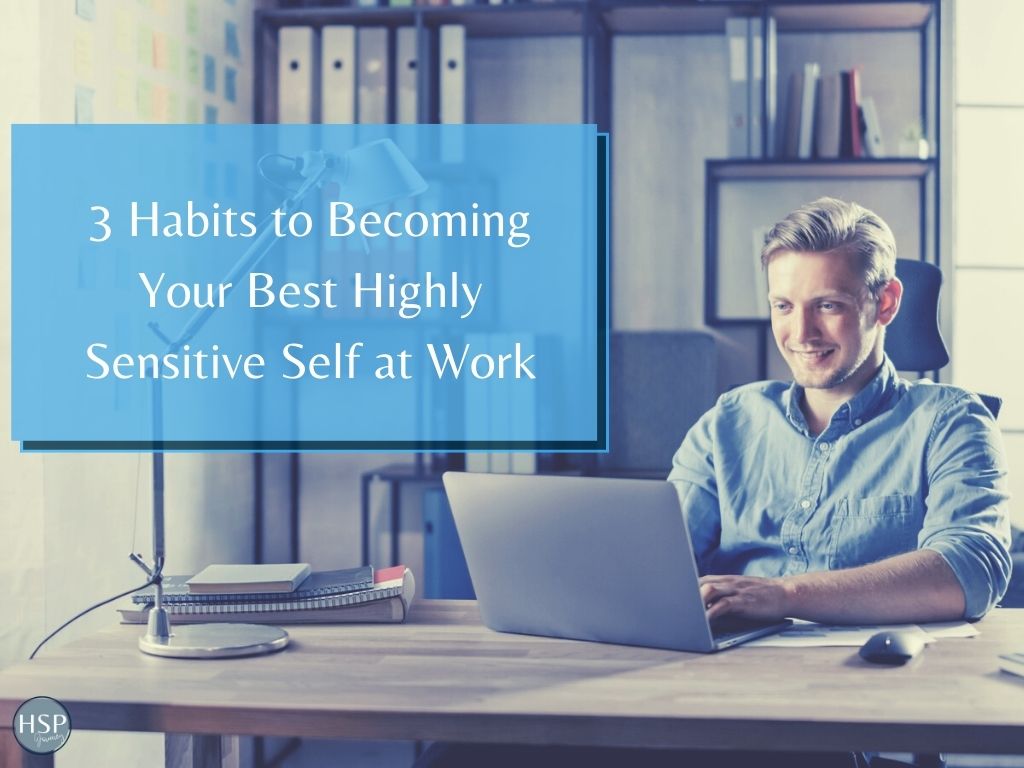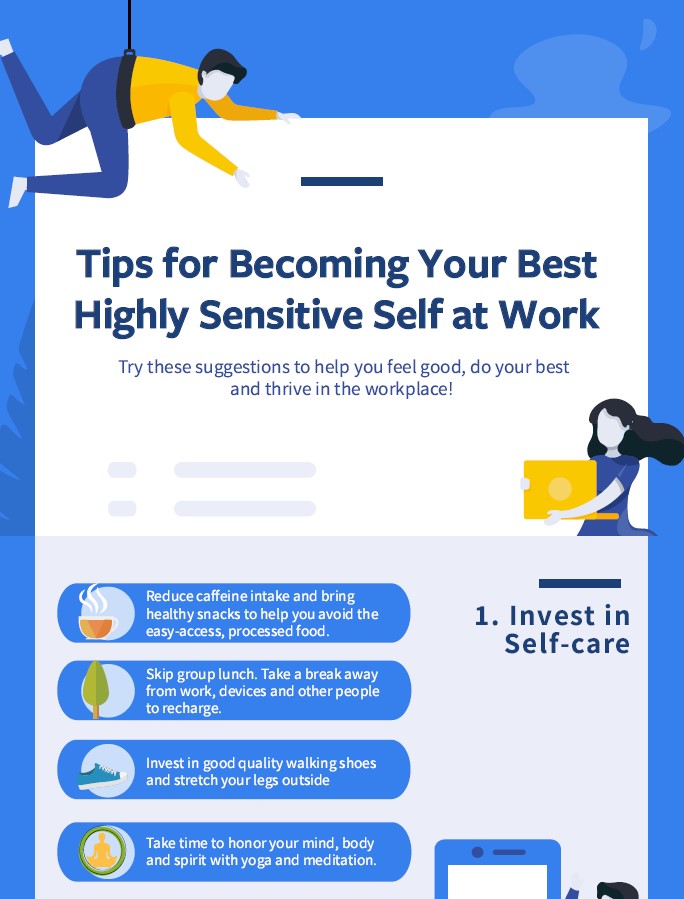Table of Contents
If you are one of the 15-20% of the population who has the highly sensitive trait, you know how challenging everyday situations can be — with environments and also with people. While no one can control every situation, there are things Highly Sensitive People (HSP) can do at their workplace to minimize environmental stimulation and emotional energy overload. This article offers three habits you can develop at work and explores how to handle obstacles (some self-inflicted) that can derail your efforts.

Here are 3 habits to becoming your best highly sensitive self at work:
Habit #1 – Recharge Your Highly Sensitive Self on Breaks and at Lunchtime
The majority of people lose energy, concentration, and productivity the more hours they work. This is especially true of HSPs! Yet it’s possible to reset your energy system with a restorative break.
That means getting away from your workspace, away from devices, and other people for 20 minutes (you can supplement shorter breaks throughout the day, too).
If possible, go outside in the fresh air. Taking a walk is a good grounding activity, but try not to use this time as part of your aerobic exercise routine. This is about resetting your mind, body, and spirit. If going outdoors is not an option, find a private space that’s relatively quiet.
Maybe your building has a meditation room or a bank of windows that doesn’t have too much traffic or noise. One of my favorite spots was the top landing of a stairwell that led to the roof of the building.
When you find this special “time out” place, make a place you frequent to restore your energy.
- Once you’ve found your spot, breathe. Take a deep inhale, then sigh it out.
- Do that again.
- If you prefer to close your eyes, put your attention on one part of your body. It could be your third eye, the crown of your head, your heart space, or the tip of your finger. Choose a focal point and rest there.
Alternatively, keep your eyes open and focus on one unmoving spot. Perhaps a tree root, a rock, a spot on the floor or wall. Perhaps bring a crystal from home and make that your focal point.
- Keep breathing slowly, deeply, and intentionally.
- Let your mind clear while you gently stay focused on the spot you chose.
In your mind, recite a mantra such as: I am open to restoring and rebalancing my energy… I release any energy that does not serve me… I am grounded, balanced, and restored…
Obstacles to Your Recharge Time
Your restorative energy break might get derailed by logistics (the manager calls a mandatory meeting over the lunch hour) or you decide that there’s too much work to stop and take a break (which is a form of self-sabotage — we all do it).
Workplace culture can also influence our self-care practices. If everyone in your department lunches together as a type of informal meeting, you might not feel comfortable breaking from the pack. Yet these or any other obstacles that pop up are opportunities to exercise your boundaries.
When you make the health of your mind, body, and spirit your top priority, you will find the time and space for your energy break — and any other self-health habits you’re developing. And as you notice how much better you feel and function, the obstacles won’t stop you from taking care of yourself. Consider also that you are setting an example for your coworkers who might be wishing they could carve out some self-care time, too.
Habit #2 – Invest in Your Environment to Meet Your Highly Sensitive Needs
HSPs are sometimes exposed to a particular stimulation for so long, that they don’t think they are bothered by it anymore. Then all at once they feel exhausted or get sick and can’t understand why. This can happen when an HSP has consciously made the effort to tolerate the stimuli – not realizing it was still affecting their system.
The hum of the ventilation fan, the glare of the overhead lighting, the stiffness of the chair, or the smell of the cleaning spray. There can be any number of irritants to our sensitive system and some of them can be easily remedied. At my workplace, the maintenance staff was happy to remove one of the fluorescent bulbs from over my desk. Other irritants may require you to take action — like buying a good set of noise-canceling headphones or a custom ergonomic chair.
Look at each element of your workspace and ask yourself how it could be changed to support you better.
What about office supplies? If your job involves a lot of stapling and the stapler you’ve been provided is heavy, noisy, and hard to squeeze, invest in your own. Would you feel better having a cleaner workspace? If so, keep your supplies on hand and care for your space like you would your home. How about visual noise? Is there a way you can arrange your space so you aren’t visually overstimulated?
Again, we often don’t realize the elements in our environment that are provoking our system or causing us to lose concentration and energy. So make it a habit to look around your environment and experiment with changing things up and see if it affects your energy, mood, or concentration.
Obstacles to Investing in Your Environment
The nature of your job or workplace might not allow you to personalize your environment. If you spend a lot of time on the phone, for example, noise-canceling headphones wouldn’t be a viable choice. If you’re in an open workspace environment, it probably wouldn’t serve you well to build walls around your desk — no matter how noisy or distracting your coworkers are.
That said, if the reason you haven’t invested in making your workspace a healthier one is that you believe your employer should be responsible for providing you with a more comfortable chair, a quieter stapler, warmer lights, and nice-smelling cleaning supplies, please consider that your self-saboteur is not being a friend to your HSP self.
This is an opportunity to work on self-boundaries. Acknowledge that you are responsible for making your space as healthy, comfortable, and productive as can be — then act on it. And don’t forget to have a little fun with your highly sensitive self.
Habit #3 – Assess Your Task Management and Fine Tune to Your Highly Sensitive Needs
Most jobs require a certain amount of task management. For HSPs, it’s an essential skill to have for two reasons: HSPs are more easily overwhelmed and tend to take on more work than required.
When the work starts to back up, when there are too many loose ends and too many priorities looming, HSPs may go into a ‘freeze’ mode where they cannot move forward in their work. Why does this happen?
The prefrontal cortex (PFC) plays a central role in cognitive control functions (reasoning, logic, decision making, attention, memory). When you feel overwhelmed, the PFC starts to shut down and it triggers the amygdala (emotional regulation), which induces mental paralysis and panic.
This task management exercise is a powerful habit to reset your mental energy. You can start every day with it or use it when you feel like you’re mentally stuck or sluggish.
- Look at your to-do list and pick five things that take less than five minutes each. (If you don’t keep a list, I recommend starting the habit. It’s a game-changer for HSPs).
- Do one of the items. Do it swiftly and without interruption.
- Continue to the next item, doing as many as you can (even more than five).
- If there are things that need doing that aren’t on the list (watering the plant, confirming a lunch date, submitting vacation days) jot them down on the list first and then do them. This signals your brain that those tasks count for something.
- As soon as you’re done with an item, cross it off the list before moving on to the next one.
This task management habit helps to build momentum with your flow of energy, focus, concentration, the feeling of accomplishment, control, and self-assuredness.
Making a habit of completing short tasks in a swift, uninterrupted manner will help boost your system and plug you back into that sense of moving forward.
Obstacles to HSP Task Management
Mostly, the obstacles in developing this habit are the self-inflicted kind. When we stop being mindful of what’s happening in our system, it’s like we’re abandoning our own ship. So try and stay in tune with yourself and as soon as you sense that your energy is stalling, take action.
What these three habits boil down to is self-care — taking restorative energy breaks, monitoring and investing in a healthy personal environment, and minimizing your overwhelm through task management. Self-care, self-care, self-care.
There are many more self-care habits for HSPs at work that could be added to this list. What would you include? What habit can you start to build that would help you become your best highly sensitive self at work?
Below is a helpful infographic with tips from this article available to download. Right click, and “save image as” to download this infographic:
Be sensitive, be free
*This post contains affiliate links and I will be compensated if you make a purchase after clicking on my links*






[…] you can successfully tackle clutter and create a more organized and functional living or workspace. Lastly, setting a brief time at the beginning or end of each day to quickly reset your workspace, […]